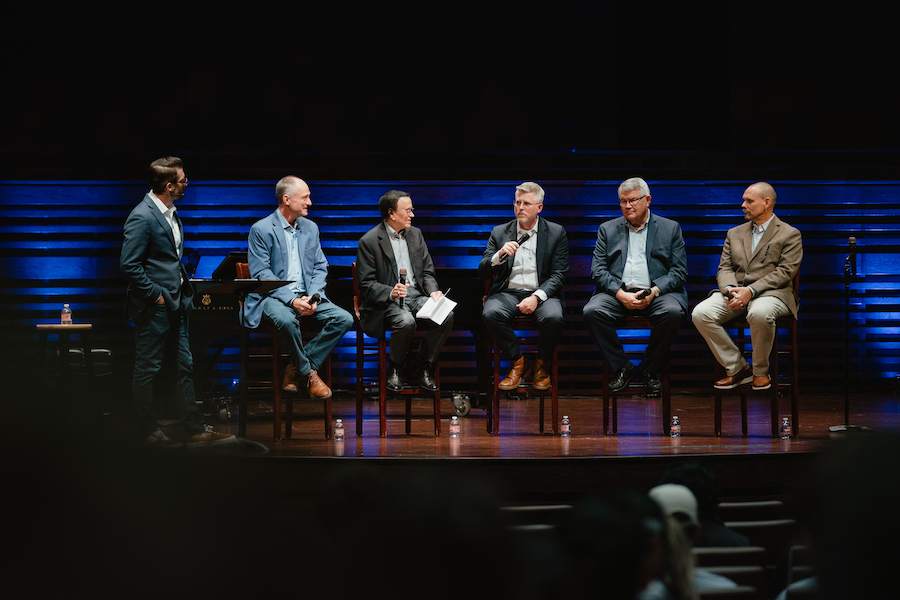Faculty panel discusses Southwestern’s globally engaged core value

Southwestern Baptist Theological Seminary (SWBTS) continued its emphasis on missions during its Sept. 10 chapel service, which featured a panel of SWBTS and Texas Baptist College (TBC) faculty discussing the seminary’s globally engaged core value.
The panel featured Dean Sieberhagen, interim dean of the Roy J. Fish School of Evangelism, director of the World Missions Center, and the Charles F. Stanley Chair for the Advancement of Global Christianity; Daniel Sanchez, distinguished professor emeritus of missions; Michael Copeland, associate director of the World Missions Center and associate professor of missions; John Mark Terry, affiliate professor of evangelism and missions; and Kevin Rodgers, associate professor of missions. Chandler Snyder, vice president for institutional relations and instructor of missions, served as panel moderator.
W. Madison Grace, provost and vice president for academic administration and dean of the School of Theology, talked about Southwestern as “a globally engaged community,” adding that the mission field could be down the street or on the other side of the world. The globally engaged core value is among six core values of the institution, which also include grace filled, Christ centered, scripturally grounded, confessionally guided, and student focused.
Grace read Matthew 28, noting that it commands Christ’s followers to fulfill the Great Commission.
“This is why we do what we do,” he said. “This is why we come to be equipped, to become effective ministers of the Gospel.”
Snyder said the panel discussion resulted from feedback from students at the spring town hall meeting. He said students wanted to hear about faculty members’ experiences and how they shaped the way they teach and lead in the classroom.
He noted the missions focus of the panel discussion was building on “the incredible, bold” Global Missions Week that the seminary observed the previous week, and added the panel participants had “over 100 years of [missions] field experience.”
Copeland spoke of the importance of prayer in being globally engaged. Christians are admonished to pray, he said, adding, “there’s no way to know where He’s sending us if we’re not listening.”
Rodgers, a new member of the seminary faculty, said he has been “encouraged to see the way that this community is actually engaged globally, even here within Fort Worth, and so many people are working with refugees, working with people who are from all over the world, here in Fort Worth, and then going all around the world. So I think it’s the total package is what you should be after in your daily life: your study of God’s Word, your devotional life, and even how you’re growing as a believer.”
Snyder said the formalization of the globally engaged core value started about two years ago. Sieberhagen explained that “we looked at some of our legacy, and from the very start of Southwestern we’ve been known as the Great Commission seminary. Dr. [Robert] Naylor is famous for saying that you can go to any time zone of the world and find a Southwesterner serving on the mission field,” referencing the seminary’s fifth president.
The seminary also has students from all over the world in its classrooms, Sieberhagen said, adding that, “Every single classroom is a globally engaged classroom.” He also noted that any program SWBTS offers is needed on the mission field.
“One of the greatest needs we have on the field right now is for theological educators,” he said, adding that Old Testament professors on the mission field also are scarce.
“Any program you’re in, we need you on the field,” Sieberhagen said.
Sanchez talked about Southwestern’s Global Leadership Development (GLD) endeavor. He said that 12 years ago, SWBTS was getting requests for help from seminaries in other countries. “We now have a consortium, which is a voluntary association of seminaries where they share resources and encourage one another,” he said. The consortium includes seminaries in Latin America, Europe, and other countries.
“We’re working with them, many of them in the shadow of a war that’s going on. But people are responding to the Gospel, and they are wanting to train more people,” Sanchez said.
Asked about the changes in how missionaries are sent, Terry said most missionaries previously went to “open countries,” where they could enter on a missionary visa. Today, he said, about 75 percent of the missionaries appointed by the International Mission Board are going into “closed,” or high security, countries.
“But those countries are essential for the progress of the kingdom, because that’s where we find the greatest lostness,” Terry said.
As the talk turned to upcoming mission trips the seminary is offering, two students were brought on stage to talk about trips they have recently taken. Cameron Wormack, a student in the 5-year program, spoke of sharing the Gospel with a refugee on a recent mission trip to Germany. Nate Croft, a Master of Divinity student, talked about how the Lord answered prayer on a mission trip to South Asia. He said the group interacted with 50 people, and two people came to Christ during the mission trip.
The panelists also advised students on how to do mission work, noting they can come to faculty members for help in getting started.
“So Romans 10 says, ‘If you confess with your mouth, Jesus is Lord,’” Sieberhagen said. “If he’s Lord, then give Him your yes, just give Him your yes. Say, ‘Lord, if and when you call. I’m not fighting. I’m not arguing. You have my yes. I will go.’”
A video of the panel discussion is available here.



